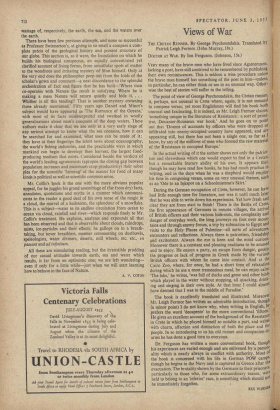Views of War
DocroR AT WAR. By Ion Ferguson. (Johnson, 15s.) VERY many of the brave men who have lived since Agamemnon, lacking a poet, have still contrived to be remembered by publishing their own reminiscences. This is seldom a wise procedure unless the brave man himself has something of the poet in him—unless, in particular, he can either think or see in an unusual way. Other- wise the best of stories will suffer in the telling.
The point of view of George Psychoundakis, the Cretan runner, is, perhaps, not unusual in Crete where, again, it is not unusual to compose verses; yet most Englishmen will find his book both unusual and fascinating. It is indeed, as Mr. Leigh Fermor claims, 'something unique in the literature of Resistance : a sort of primi- tive, Douanier-Rousseau war book.' And he goes on to point out that 'Dozens of accounts by officers who were dropped or infiltrated into enemy-occupied country have appeared, and are appearing still, but there has not been a single one, as far as know, by any of the millions of men who formed the raw material of the Resistance in occupied Europe.'
In the actual writing of it the author shows not only the patriot' ism and shrewdness which one would expect to find in a Cretan, but a remarkable literary ability of his own. It appears that, though he may have read few books, he has had much practice in writing, and in the days when he was a shepherd would employ his time in composing verses, some on very unusual themes, such as an 'Ode to an Inkspot on a Schoolmistress's Skirt.'
During the German occupation of Crete, however, he can have had little enough time for literature, nor was it until much later that he was able to write down his experiences. Yet how fresh and clear they are from start to finish! There is the Battle of Crete, the first appearance of Germans in remote villages, the arrival of British officers and their various hide-outs, the complexity and danger of everyday work, the long journeys on foot over moue. tains and through enemy forces, a trip by submarine to Egypt and visits to the Holy Places of Palestine—all sorts of adventures, encounters and reflections. Always there is patriotism, friend! hiP and excitement. Always the eye is keen and the mind curious, Moreover there is a constant and pleasing readiness to be amused and to enjoy. He enjoys a party, an escape from danger, gossip, the progress or lack of progress in Greek made by the various British officers with whom he came into contact. And at the Cairo Zoo, where, for once, he had a short time of relaxation during which he ate a most tremendous meal, he can enjoy 'calm. 'The lake,' he writes, 'was full of ducks and geese and other birds which played in the water without stopping, all quacking, drink' ing and singing in their own style. At that hour I could almost have deemed that I was in the middle of Paradise.'
The book is excellently translated and illustrated. Moreover Mr. Leigh Fermor has written an admirable introduction, though (a minor point) I do not know why, when writing in English, he prefers the word 'decapente' to the more conventional 'fifteen, He gives an excellent account of the background of the Resistance in Crete in which he played himself so notable a part, and writes with charm, affection and distinction of both the place and the people. In so introducing to us his old runner and companion-in' arms he has done a good turn to everyone.
Dr. Ferguson has written a more conventional book, though his experiences are varied enough and are enlivened by a person' ality which is nearly always in conflict with authority. Most of the book is concerned with his life in German POW camps' though he begins in the Navy and is captured in Greece after the evacuation. The brutality shown by the Germans to their prisoners' particularly to those who, for some extraordinary reason, were held to belong to an 'inferior' race, is something which should not be immediately forgotten.


































 Previous page
Previous page